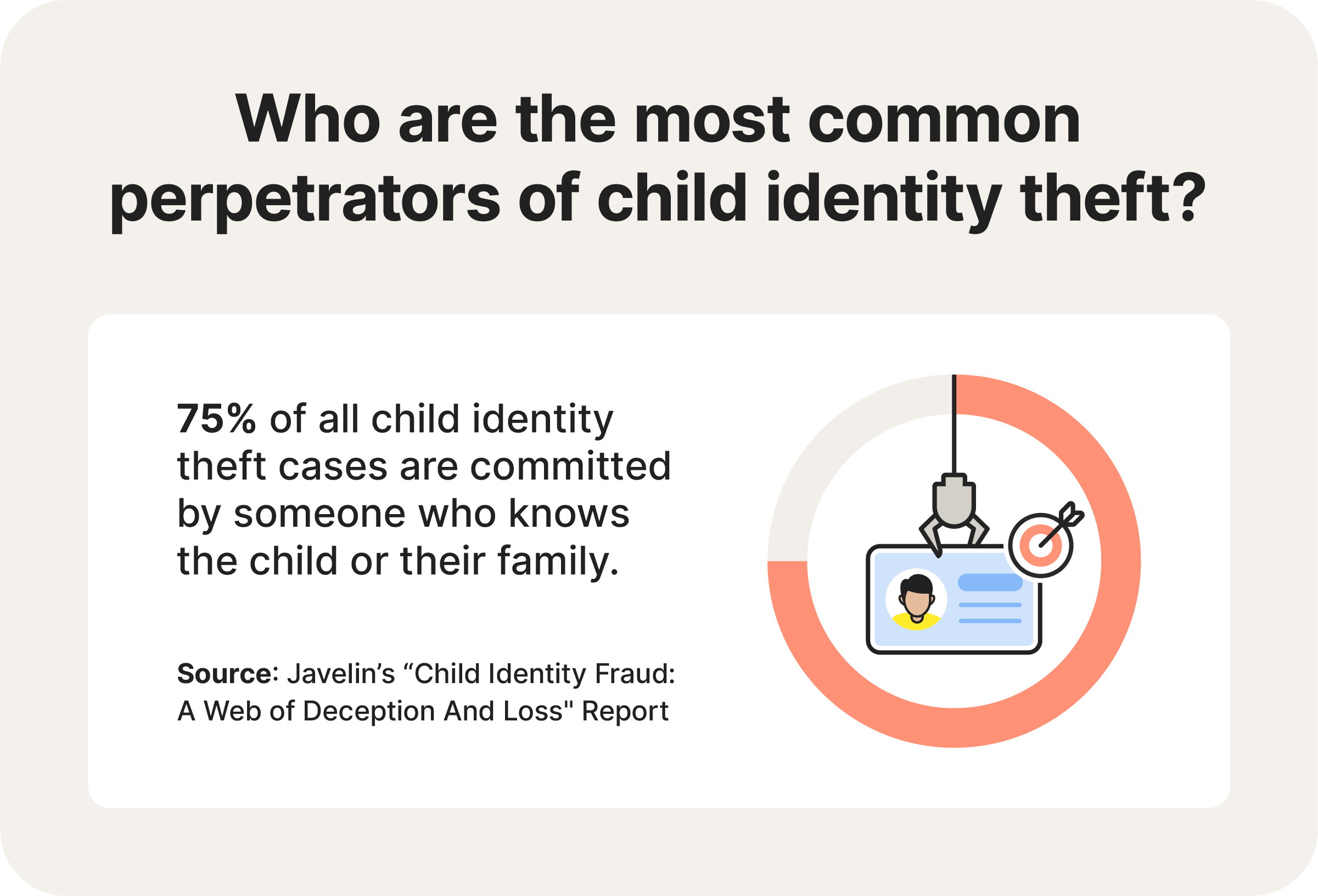Don’t assume your child is safe from identity theft just because they’re a minor. In 2024 alone, the FTC received over 21,000 identity theft reports involving victims aged 19 and under.
If left unresolved, identity theft can seriously impact your child’s financial future — causing credit damage and fraudulent debt delinquency that makes borrowing more difficult. The good news is you can take steps to better protect your child from the risks, helping protect their identity and credit health.
Keep reading to learn what child identity theft is, how it happens, and what you can do to help prevent it from harming your child’s future.
What is child identity theft?
Child identity theft involves someone stealing a minor’s personal information and using it fraudulently to open credit accounts, take out loans, or apply for government benefits. This can leave the child with debt and credit damage they may not discover until they first apply for a loan or credit card as an adult.
While children, especially those under the age of seven, are some of the most likely targets for identity theft, they’re also poorly positioned to defend against it. Aside from the fact that many children don’t have credit protection or monitoring in place, the perpetrators are often people close to the child, exploiting their position of trust.
Child identity theft often begins with a stolen Social Security number (SSN) or birth certificate, which the thief can use to assume the victim’s identity. In one case, a young woman discovered nearly $50,000 in debt under her name when she applied for her first home loan — all because a family member had used her SSN to open and max out credit cards.


Since the bills went to a different address, the fraud went undetected for years. It took official police reports, complaints to the Federal Trade Commission (FTC), and credit disputes to start fixing the damage, but the unpaid debt and subsequent credit score issues still delayed her homeownership.
However, it’s not always the case that child identity thieves have a close relationship with the victim. There are lots of attack vectors fraudsters can use to steal children’s identities, even when they don’t know them.
How does child identity theft occur?
Child identity theft can happen in many ways — none of which are the child's fault — and it often goes unnoticed until the damage is already done. Data breaches, phishing scams, and lost or stolen identifying documents can all put children at risk.
Here’s a more detailed look at some of the most common ways child identity theft occurs:
- Data breaches: When schools, pediatricians, or other organizations that store children’s personal information suffer a data breach, sensitive data can end up in the hands of cybercriminals who use it in identity theft or sell it on the dark web.
- Scams: Phishing scams, such as fake texts and emails where scammers pretend to be representatives for trustworthy companies or organizations, can trick parents or children into revealing SSNs and other sensitive details.
- Oversharing information: Oversharing personal information online, including your child’s full name, birthdate, and address, can make it easier for scammers to steal a child’s identity. This is particularly risky if you overshare on social media accounts that don’t have privacy settings enabled.
- Sharing passwords: Poor password security is just as much a risk for children as it is for adults. Passwords shared with friends or used across multiple websites or apps increases the risk that a hacker can gain access to a child’s accounts and the sensitive information within.
- Stolen or lost personal data: Documents like birth certificates, medical records, or Social Security cards can be misused by opportunistic identity thieves if they’re lost or stolen, highlighting the importance of storing them safely at all times.
- Theft in the family: A disproportionate number of child identity theft cases are perpetrated by a relative with close access to the victim’s sensitive information, who secretly uses it to commit identity theft.
What are the warning signs of child identity theft?
When a criminal gets access to a child’s personal information, like their Social Security number, they could use it alongside other stolen information to open credit card accounts, take out loans, or apply for government benefits. There are some warning signs associated with these forms of fraud, like the victim having a credit file unexpectedly or being contacted by credit card companies or the IRS.
To help protect your child, look out for these signs of identity theft:
- An existing credit file or report: Children shouldn't have a credit file or credit report. If they do, and especially if it shows credit activity, it's a major red flag that their identity has been stolen. You can check if your child has a credit report by contacting the three major credit bureaus, Experian®, Equifax®, and TransUnion®.
- Pre-approved credit card offers in the mail: While credit offers addressed to your child may be a simple mistake by the credit card company, it can also indicate that someone is using their identity to apply for credit fraudulently.
- Government benefits application denied: If your family is turned down for benefits because they’re already being claimed under your child’s name, it could mean their SSN was compromised and used in benefits fraud.
- Income or tax notices from the IRS: The IRS may send a letter about unpaid taxes or income reported under your child’s name. This is a possible sign that someone has used their identity to work or file a fraudulent tax return.
- Calls or letters about unpaid bills: Debt collectors reaching out to your child about unpaid accounts strongly indicates that someone has used their information to take out credit or services.
How to protect against child identity theft
Spotting red flags is the first step in protecting your child from the effects of fraud. But, to help prevent identity theft in the first place, it's important to take a proactive approach toward limiting exposure of your child's personal information. This includes securing sensitive documents, freezing your child’s credit, teaching online safety, and using identity theft protection.
Here are some simple ways to keep your child's sensitive information safer and reduce their identity theft risk.


Safeguard your child’s SSN
Avoid sharing your child’s SSN unnecessarily. If an organization or individual requests it, always ask what they need it for, whether it’s possible to use a different identifier instead, and if you’re able to provide the last four digits instead of the full number. Be wary of completely unsolicited requests for your child’s SSN, and always verify that the person contacting you is who they say they are.
Store sensitive information securely
Keep documents containing your child’s personally identifiable information stored in a secure place. A locked filing cabinet, safety deposit box, or home safe are all great options for storing papers like medical reports and bills, insurance policies, birth certificates, passports, and Social Security cards. Take extra care whenever you need to carry these documents with you, as losing them can put your child at risk.
Shred sensitive documents
Make sure to shred any documents containing your child’s personal information before throwing them away. If you don’t have a shredder, look for a local shredding service, sometimes provided by banks. Alternatively, cut them up yourself, being diligent to ensure they can’t be easily pieced back together.
Freeze your child’s credit
If your child is under 16, contact the three major credit bureaus to place a credit lock or freeze on their credit report. These protective measures help prevent credit fraud by denying creditors and other third parties access to their credit report, meaning fraudsters can’t open new credit accounts in your child’s name.
Wipe old computers or cell phones
Old digital devices likely contain lots of personal information about your child. Whenever you replace a phone or computer, make sure you fully remove all personal information from the old device by restoring it to its default factory settings and removing any storage devices (like SD cards) before selling, donating, or recycling it. Performing a factory reset will erase all data, including any sensitive information stored in documents.
Educate your child about online safety
Teach your child about the risks of sharing personal information and set clear rules about what shouldn’t be posted online or on social media. It’s also a good idea to set boundaries around not giving out personal details by phone, text, or email without your permission, and talk about how to confidently and politely say no to these requests.
Use identity theft protection services
Identity theft protection services like LifeLock can help you monitor your child's online exposure, SSN, and credit file for signs of identity theft. If we find their information is on people search sites or the dark web, or is used in an application for credit or services, you'll receive a notification so you can take action to help protect their identity.
LifeLock Family Plans come with protection for two adults and up to five kids. LifeLock is the leader in identity theft protection, so you can rest easy knowing your entire family is in good hands.
What to do if your child is a victim of identity theft
If you discover someone is misusing your child’s information to commit identity theft, acting quickly can help limit the damage. Key steps to take include closing any fraudulent accounts, checking and freezing your child’s credit, and reporting the theft to the credit bureaus and the FTC.
Here’s a more detailed look at the process to help your child recover from identity theft:
Request a free credit report for your child to get a full overview of any fraudulent credit activity. Then, contact the credit bureaus and request a manual search of your child’s file for a more comprehensive review of your child’s credit record. Note the dates you make phone calls, mail letters to the credit agencies, or receive contact back to provide as evidence in later fraud reports.
2. Shut down fraudulent accounts
Contact any creditors who were involved in the criminal misuse of your child’s information and request that they close the fraudulent accounts. Keep proof of the suspected identity theft through screenshots and documentation, asking the businesses for written confirmation that they have closed the account and that your child isn’t responsible.
3. Freeze your child’s credit
Place a credit freeze on your child’s credit report to make it harder for someone to open new accounts in their name. The freeze will remain until you tell the credit bureaus to remove it. At the same time, ask each credit bureau to remove all fraudulent information associated with your child’s name and SSN, including accounts, inquiries, and collection notices. You’ll need to provide the agencies with a copy of the Uniform Minor’s Status Declaration.
4. File fraud and identity theft reports with the FTC
Contact the Federal Trade Commission directly to file an identity theft report and create a record of any fraudulent accounts that were created in your child’s name following their identity being stolen.
- To report the fraudulent accounts, go to https://reportfraud.ftc.gov/.
- To fill out the identity theft report, go to https://identitytheft.gov/.
What to do if you suspect a parent of identity theft
Unfortunately, child identity theft is usually not committed by strangers. In fact, research shows that in 75% of cases, it's someone the child knows like a parent, guardian, or other close relative with easy access to sensitive personal information. Because of the close relationships involved, family identity theft can be harder to detect, report, and resolve than other types of identity theft.


However, if you suspect that a parent or someone close to a child is misusing their identity, taking action can help protect the victim’s financial future.
If you're not the child’s legal guardian, you may not be able to access their credit report or freeze their credit. However, you can still file a report with the FTC and contact your state’s Child Protective Services (CPS) or local law enforcement department. These agencies can investigate the situation and take steps to help protect the child’s identity and well-being.
Help keep your family safe with LifeLock
Protecting your child from identity theft can help them enjoy a more secure financial future, but you don't have to do it alone. LifeLock Family Plan helps protect you and your children from identity theft. With monitoring, alerts, and restoration support, you’ll have added peace of mind knowing your child’s identity is being actively safeguarded.
FAQs
Why do identity thieves target children for identity theft?
Children are often targeted by identity thieves because the fraud can go undetected for years. Most children don’t have credit reports and won’t apply for credit until they’re older, giving thieves a long window to misuse their information. Their frequent use of social media can also make them more vulnerable to personal information exposure and phishing scams.
How common is child identity theft?
According to the child identity fraud report published by Javelin Strategy & Research in 2022, 915,000 U.S. children were victims of child identity fraud in the previous year. The study also found that “children under the age of seven were most likely to be victimized by ID theft and subsequent ID fraud.”
What are the consequences of child identity theft?
The consequences of child identity theft can be severe and long-lasting. Damage caused to credit scores by identity theft can prevent your child from receiving government benefits, getting a job, and securing loans for study or major purchases such as a house or car.
Editor’s note: Our articles provide educational information. LifeLock offerings may not cover or protect against every type of crime, fraud, or threat we write about.
This article contains
- What is child identity theft?
- How does child identity theft occur?
- What are the warning signs of child identity theft?
- How to protect against child identity theft
- What to do if your child is a victim of identity theft
- What to do if you suspect a parent of identity theft
- Help keep your family safe with LifeLock
- FAQs
Start your protection,
enroll in minutes.
LifeLock is part of Gen – a global company with a family of trusted brands.
Copyright © 2026 Gen Digital Inc. All rights reserved. Gen trademarks or registered trademarks are property of Gen Digital Inc. or its affiliates. Firefox is a trademark of Mozilla Foundation. Android, Google Chrome, Google Play and the Google Play logo are trademarks of Google, LLC. Mac, iPhone, iPad, Apple and the Apple logo are trademarks of Apple Inc., registered in the U.S. and other countries. App Store is a service mark of Apple Inc. Alexa and all related logos are trademarks of Amazon.com, Inc. or its affiliates. Microsoft and the Window logo are trademarks of Microsoft Corporation in the U.S. and other countries. The Android robot is reproduced or modified from work created and shared by Google and used according to terms described in the Creative Commons 3.0 Attribution License. Other names may be trademarks of their respective owners.







